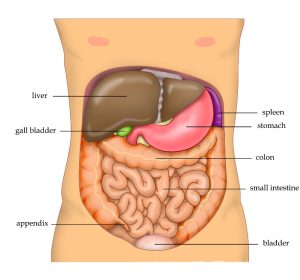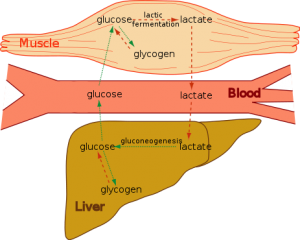By Eva Vitucci
The human body is an amazing entity, and as can be seen by watching the recent Winter Olympics, the body can accomplish great physical feats! Becoming an Olympic athlete requires years of practice and training. Interestingly, while most people may focus on how critical it must be to build and maintain the muscles needed to compete in these sports, another important part of our bodies, our liver, is often overlooked.
The liver is the largest organ inside the human body and is located in the upper right side of our abdomen. The liver is a unique organ because blood flows to the liver from both the heart and the intestines, is processed, and then is sent out to be used by the rest of the body. The connection between the liver and the heart supplies the liver with oxygen-rich blood. The connection between the liver and the intestines supplies the liver with blood rich in nutrients. Together, these connections are critical for the hundreds of different functions our liver performs – definitely gold medal worthy! One of these Olympic functions is storing and supplying energy for our body’s needs.
Imagine: it’s the night before the Olympic finals and we’ve just finished eating our lucky pre-race meal. After we’ve eaten, our food makes its way through our digestive tract and breaks down into various nutrients. Sugar molecules, such as glucose, are a common product of this process and are taken up by the cells that line our intestines. These cells then release their sugar packages into the nearby blood stream, which flows directly from the digestive tract to the liver. As too much sugar in our blood at one time is bad, the liver can remove the sugar released in our blood, and store it in its cells in the form of glycogen (a complex chain of individual glucose molecules). Hours later, in the middle of our morning cross-country ski race, our muscles need energy (sugar), but our muscles have already used up the sugar molecules circulating in our blood. Our liver can then break down its stored glycogen and release the sugar back into our blood, where our muscles can uptake the sugar and use it for energy, powering us through the race.
Other major functions of our liver include creating and supplying proteins from our diet and removing toxins from our body. The former is essential for building muscle, and the latter is essential for cleansing our bodies of toxins we encounter in our environment, breaking down ingested medicines, and removing waste products that build up naturally as a result of bodily processes.
Together, storing and supplying energy for our bodies, providing protein for our body, and cleansing our bodies are all crucial processes for keeping us alive. Thus, maintaining a properly functioning liver is extremely important. Luckily, it’s completely possible to keep our livers functioning properly and healthy. We can achieve this by maintaining a balanced diet, performing regular exercise (be cautious if taking workout supplements!), and avoiding binge and excessive alcohol drinking. We don’t have to be an Olympic athlete to benefit from a healthy liver, but having a healthy liver can certainly help us feel like a gold medalist every day.
Edited by Mike Pablo


